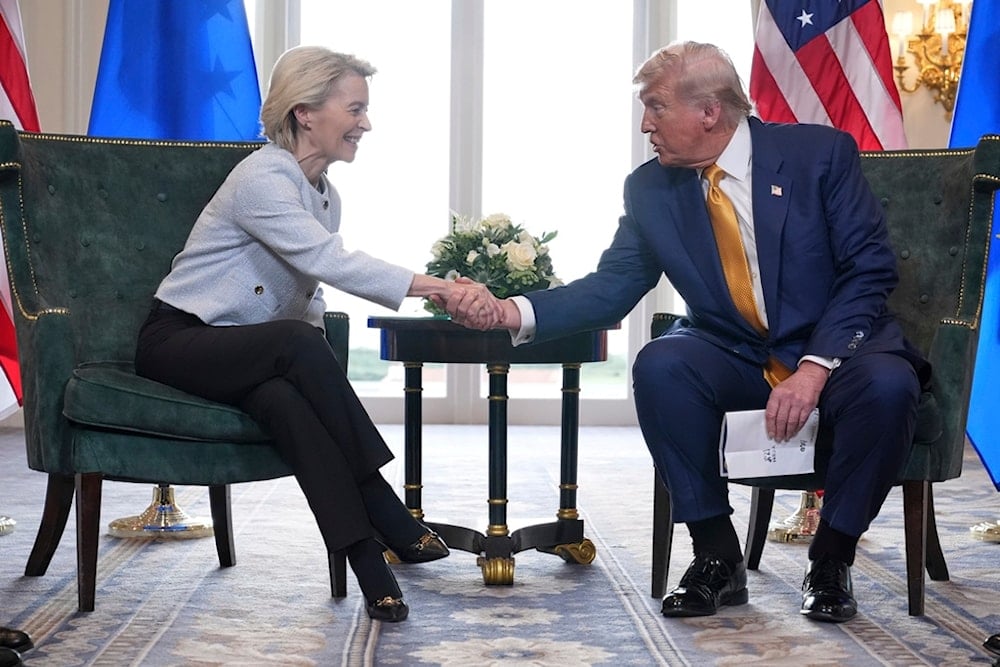EU secures tariff cuts on cars, fails to protect wine in US trade deal
The new US-EU trade deal reduces American tariffs on European cars but leaves wine producers exposed, while Brussels grants wider access to US farm goods and commits to further talks on exemptions.
-

President Donald Trump and European Commission President Ursula von der Leyen shake hands after reaching a trade deal at the Trump Turnberry golf course in Turnberry, Scotland Sunday, July 27, 2025 (AP Photo/Jacquelyn Martin)
Details released Thursday of a new trade arrangement between Washington and Brussels revealed that while European carmakers will benefit from reduced US tariffs, the continent's wine industry remains exposed.
The agreement stems from a framework deal reached in July 2025 between US President Donald Trump and European Commission President Ursula von der Leyen, after months of escalating tariff threats that risked spiraling into a transatlantic trade war. Trump's earlier "Liberation Day" tariff plan had imposed blanket duties of 10 percent or more on imports worldwide, with the EU among the hardest hit. The July accord was designed to cap those measures and prevent further escalation.
Under the plan, most European exports will face a flat 15 percent duty when entering the United States, covering key industries such as cars, pharmaceuticals, semiconductors, and lumber. While the levy still imposes a notable cost, EU officials emphasized that it is significantly lower than the 30-50 percent rates Trump had threatened earlier this year.
Cars Gain, Wine Loses
EU Trade Commissioner Maros Sefcovic described the outcome as the most advantageous deal Washington has offered any partner. "This is the most favourable trade deal the US has extended to any partner," he told reporters in Brussels, stressing that the levy "will not come on top of existing tariffs."
Sefcovic confirmed that the duty on European cars, currently set at 27.5 percent, would drop to 15 percent and apply retroactively from August 1, once the EU passes legislation removing its own industrial tariffs on American goods. "We are working very hard on this," he said.
But efforts to spare Europe's wine and spirits producers from new costs failed. "Unfortunately, here we didn't succeed," Sefcovic admitted, though he added that "these doors are not closed forever."
The French wine exporters federation called the outcome "hugely disappointed." Speaking to AFP, Gabriel Picard, who heads the group, warned, "We are certain that this will create major difficulties for the wines and spirits sector." Christophe Chateau, speaking for Bordeaux producers, called the result "bad news" that would further burden exports to their biggest market, though he noted it was preferable to the earlier threat of tariffs as high as 200 percent. French trade minister Laurent Saint-Martin pledged that Paris would press for "additional exemptions" in upcoming rounds.
Read more: EU trade deal shows submission to US pressure: Borrell
Uneven Trade Balance
In exchange for tariff relief on cars, the EU committed to significantly expanding access for US agricultural and seafood products, including pork, bison, tree nuts, dairy, fruits, and vegetables. Brussels also announced that a select group of European exports, such as cork, aircraft and aircraft parts, and generic pharmaceuticals, would enjoy a "zero or close to zero" tariff beginning September 1.
Beyond goods, officials confirmed that the broader agreement also involves EU pledges to boost energy purchases from the United States and to encourage investment in American strategic industries, including advanced semiconductors and defense supply chains.
Commission President von der Leyen stressed that negotiations remain open. "This is not the end of the process, we continue to engage with the US to agree more tariff reductions, to identify more areas of cooperation, and to create more economic growth potential," she said.
For now, the deal averts the most damaging aspects of a looming trade confrontation, but it also highlights the uneven balance: Europe gains relief on autos and some industrial exports, while sacrificing ground in agriculture and leaving its emblematic wine industry on the defensive.

 4 Min Read
4 Min Read










